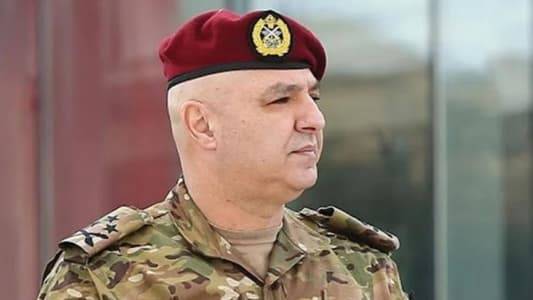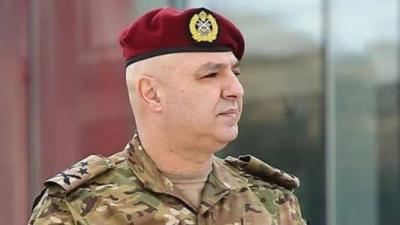Presidential vacancies have occurred several times since 1988, each time corresponding with significant security instability. While security and military forces continue to monitor unstable conditions and individual incidents, how can these forces confront widespread security lapses across multiple regions? Could any explosion be an attempt to lure and target the military and its commander?
The Lebanese Army, under the leadership of General Joseph Aoun, has navigated severe security challenges, notably maintaining order during the protests that erupted on October 17, 2019, halfway through President Michel Aoun's term. Should the army have suppressed the uprising forcefully and reopened blocked roads, or should it have considered the demands of the citizens united under various loyalties and affiliations? At that time, the election of a new president was not an immediate concern, and the army's actions were not influenced by presidential aspirations, including those of General Joseph Aoun. The army's approach since 2016 suggests that the leadership has recognized threats to security and aimed to manage public movements without letting them devolve into chaos.
While some criticize the army's initial leniency in not forcefully clearing roads during the early weeks of the protests, others point out its failure to prevent assaults on the protests in various locations, particularly at the Ring Bridge and Martyrs' Square. Was there a genuine concern that clashes with the assailants could escalate into a larger confrontation with Hezbollah, given that the identity and affiliations of the attackers were clear, as reiterated by Hezbollah’s Secretary-General, Hassan Nasrallah, in a November 11 speech accusing the October 17 uprising of conspiring against the party and alleging American embassy involvement?
If the protests did not take on a violent security character due to their peaceful nature, the army did manage to contain several significant security explosions. The first incidents occurred in Khalde, occurring in two parts in August 2020 and again in August 2021, involving clashes between local tribes and Hezbollah, resulting in fatalities. The case remains pending in military court with tribal suspects detained, but no Hezbollah members have been arrested, potentially reigniting tensions depending on the rulings.
Another notable incident was the Qabrchmoun clash on June 30, 2019, during the attempted passage of a convoy led by Jibran Bassil, head of the Free Patriotic Movement, which met resistance from local armed groups and members of the Progressive Socialist Party, leading to casualties. This case is also pending in military court.
The third incident occurred in Tayouna on October 14, 2021, when protesters demanding the removal of Judge Tarek Bitar from the Beirut port explosion investigation came into conflict with residents and supporters of Hezbollah and Amal, resulting in injuries. The army intervened to restore order, which led to further injuries. This incident, too, is before military court and might lead to resolutions regarding loosely related issues.
Several other scattered incidents also occurred, but these were notably serious, with the army acting as a guarantor of security, especially in the Tayouna event, where the army faced armed Hezbollah supporters who resisted evacuation from the area.
However, while containing such dangerous incidents is possible, the likelihood of their recurrence remains due to ongoing underlying tensions and the proliferation of weapons, particularly those held by Hezbollah. The army's continual efforts against drug-trafficking networks display significant and bold steps involving high-level figures, but setbacks may arise if certain factions aim to set traps for the army and its commander, posing serious threats to security during a presidential vacuum.
Historical examples illustrate the potential for significant security collapses in the absence of presidential authority. In 1988, the presidential void allowed the rise of “Liberation War” and “Cancellation War.” By 2007, amidst the blockade against Prime Minister Fouad Siniora’s government, the military was compelled to neutralize the threat posed by Fatah al-Islam in Nahr al-Bared.
The most significant security collapse occurred on May 7, 2008, shortly after the end of Emile Lahoud's term, during Siniora's beleaguered government, in which Hezbollah utilized its arms in internal conflict. The violence escalated following the presidency of Michel Sleiman from May 24, 2014, triggering numerous terrorist attacks amidst the Syrian conflict that threatened Lebanese stability.
In the current vacuum, the security threat persists, albeit perhaps not at the scale witnessed during previous conflicts such as the battles in Arsal and Ras Baalbek. Nonetheless, security breaches might still arise from extremist terrorist cells, similar to the Kfifoun cell dismantled in September 2020.
In this context, the army’s interventions in local disputes often serve containment rather than resolution. Such incidents in Tayouna, Qabrchmoun, and Khalde indicate a desire from involved parties to reach settlements. However, the potential for politically motivated assassinations remains, raising questions about who possesses the capability to execute such acts, and whether a deterioration from smaller conflicts to significant security breakdowns is plausible.
The current situation, marked by political stagnation and the blocked path to elect a new president, could lead to heightened chaos if certain parties aim to undermine General Joseph Aoun's candidacy, hinting at a complex interplay of regional and international agreements regarding the presidential election.




